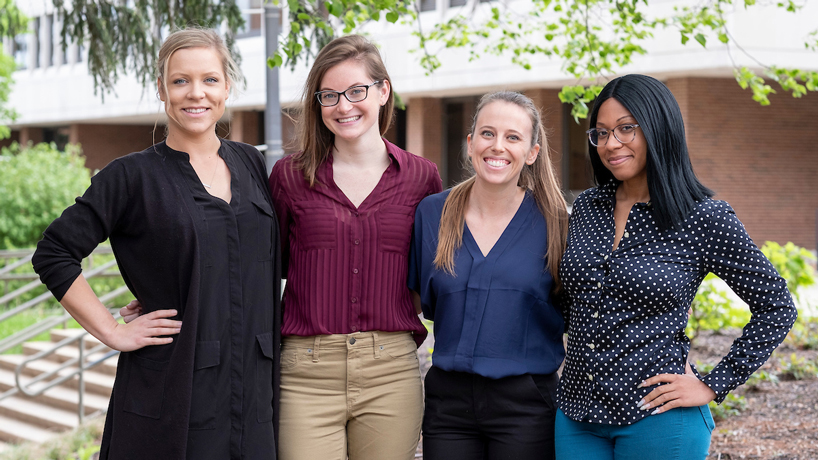
Criminology and Criminal Justice PhD students (from left) Kristina Thompson Garrity, Jennifer O’Neill, Paige Vaughn, Cherrell Green and Jennifer Gerlomes Medel (not pictured) all received national recognition for scholarly work in the past academic year. (Photo by August Jennewein)
The University of Missouri–St. Louis has long been recognized as one of the nation’s premier training grounds for future criminologists, and that reputation isn’t changing.
This academic year, Department of Criminology and Criminal Justice PhD students Kristina Thompson Garrity, Cherrell Green, Jennifer Gerlomes Medel, Jennifer O’Neill and Paige Vaughn each received national awards or other honors for their scholarly papers.
“Having so many of our PhD students’ scholarly work recognized at the national level is great – for the students, for the department and for UMSL,” said Elaine Doherty, professor and the department’s graduate program director. “These accomplishments reflect the talent and creativity of our students, the strong mentorship that they are receiving from our faculty and the excellence of UMSL’s graduate program in criminology and criminal justice.”
Garrity won first place in last fall’s Gene Carte Student Paper Competition put on by the American Society of Criminology. Her paper, titled “Rural Islands or Not? Exploring rural-urban interdependency, labor markets, and violence,” argued that criminological research on rural places is incomplete because some rural places can be more connected to nearby urban areas than others. She specifically considers the availability of employment and argues that violent crime may be lower in rural places where people can commute to nearby cities.
Her dissertation is building on this work, taking a comprehensive look at labor markets, rurality and both violent and property crime.
Green won the Western Society of Criminology’s Miki Vohryzek-Bolden Student Paper Competition earlier this year with a paper titled “Desistance and Disabled Masculine Identity: Exploring the Role of Disability in the Desistance Process among Offending Men.”
The paper proposed a theoretical model to explain how violently acquired impairments can serve as a turning point in the life course of active male offenders or can lead to their further entrenchment in criminal lifestyles.
Green previously won a 2018 award from the Academy of Criminal Justice Sciences’ Juvenile Justice and Delinquency Section for a paper called “Race, Femininity, and School Suspension.”
Medel was one of two winners of the Graduate Student Paper award from the American Society of Criminology’s Division of Victimology for a paper examining instances of court-reported civil protection order violations. Her analyses of a sample of cases from St. Louis County reveals that court-reported protective order violations are more likely when the petitioner alleges a wider variety of abusive acts against the respondent when initially filing for the protective order and when the petitioner and respondent are or were previously married or have children in common. The likelihood of court-reported protective order violations is reduced when the petitioner and respondent live together.
O’Neill won a place in the Journal of Research in Crime and Delinquency Graduate Student Publishing Workshop coming up in July at the University of Maryland. The workshop aims to train young scholars about the publishing process, including focusing on skills as authors and reviewers.
As part of her application, O’Neill submitted a description of a working research paper titled “Symbolic Interactionism, Reflected Appraisals, and Delinquency: Examining the Moderating Role of Anticipated Social Rewards.” She conducted a quantitative study, building on previous literature, into the effects of an individual’s perceived social rewards when associated with delinquent behavior.
Vaughn was accepted to participate in the Law and Society Association’s Junior Scholars Workshop, which brings together graduate students, postdoctoral fellows and assistant professors who are interested in socio-legal studies. They attend panel presentations on professional development topics, present their work and review that of their peers in smaller breakout sessions.
Vaughn’s research explores how low clearance rates of crimes committed against minority – particularly African American – victims and in minority areas are related to characteristics of people, places and crimes.
“The department has done such a good job encouraging students to compete at a national level,” Garrity said, “and the faculty are really a big part of our students’ success.”














